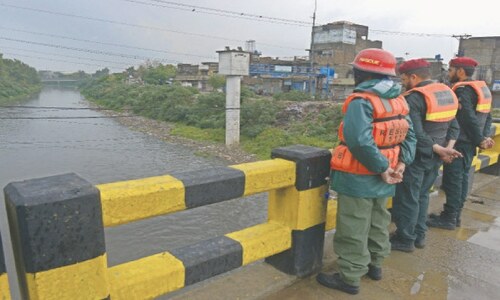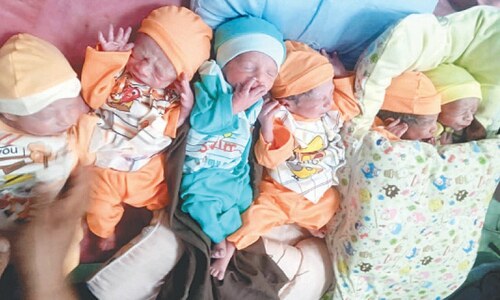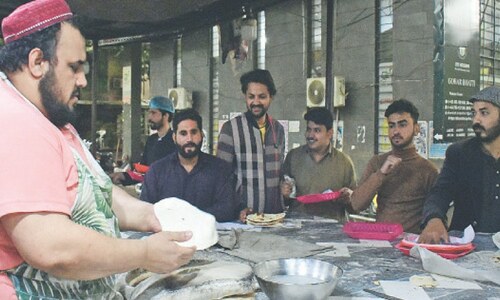ISLAMABAD: Jamiat Ulema-i-Islam (JUI-F) workers and supporters taking part in the Azadi March have created a soft image in the hearts of the local people, media and even the rulers.
Before arrival of the marchers, not only the environment of the city was tense but also the citizens were terrified as the capital gave the look of being “under siege” due to around 700 shipping containers placed to block most of the roads. Panic buying was also seen before arrival of the protesters.
The residents feared that they would face a very difficult situation as the marchers were “extremists.” However, the participants not only started visiting markets, parks and grounds but they also kill their time by playing different games such as cricket, football, badminton and volleyball. They have proved that they are not much different compared to most of the residents of the city.
“After interaction with them, I have felt that not only there is innocence in them but we don’t have to get scared of them as they are also peace loving people,” said Maqbool Ahmed, a resident of Sector G-9, while talking to Dawn.
Similarly, after arrival of the participants the media has changed its tone and started showing the marchers starting their day with reading newspapers and visiting parks and markets. They also play a number of games. It also showed sufferings of the marchers when their camps were uprooted due to a windstorm and rain.
Similarly, Prime Minister Imran Khan directed the Capital Development Authority (CDA) chairman to visit the venue of the sit-in at H-9 and mitigate the sufferings of the protesters.
University of Health Sciences Vice Chancellor Dr Javed Akram told Dawn that the fear of the unknown was the worst fear of all.
“There was a sense of insecurity among the residents of the capital but confidence developed when they started interacting with the participants of the sit-in. The residents have realised that they don’t have to worry about the protesters,” he said.
Dr Akram blamed the media for being interested only in highlighting negative things rather than positive aspects.
“Media remained busy in showing batons and parades of the participants so there was panic in the city that militants might be coming to the federal capital. However, after interaction with the participants their views have changed,” he said.
Head of the Psychiatry Department at Pakistan Institute of Medical Sciences (Pims) Dr Rizwan Taj said interactions between different segments of society always removed misconceptions.
“It is because our behaviour changes due to interactions with people and level of acceptance increases,” he said.
Another psychiatrist of the hospital, requesting not to be quoted, said it was human psychology that people feel sympathy for those who face difficulties.
“People have been hearing that hundreds of participants of the Azadi March fallen sick and four of them died due to different reasons. They are also living far from their families. So a soft corner has developed among the residents of the capital.”
He said it was a fact that the image of the Molvi was not positive in society and they were considered ‘illiterate’ as they spoke against rights of women and did not accept logic.
“However, another fact is that Maulana Fazlur Rehman is a liberal person who defended the right of Benazir Bhutto to become the prime minister and also became partner of her government. Moreover, the participants of Azadi March have not disturbed the city and the only disturbance the citizens are facing is due to blockade of some roads by the government,” he said.
When contacted, Pakistan People’s Party’s (PPP) senior leader Farhatullah Babar expressed concerns over the health, shelter and hygiene issues at the venue.
He said JUI-F’s senior leader Akram Khan Durrani had informed him that blankets and waterproof tents were being provided to the marchers.
Mr Babar said the JUI-F had planned to observe the sit-in for a long time even after Rabiul Awal 12.
Talking to Dawn in Parliament House, MNA Asad Mehmood, son of Maulana Fazlur Rehman, said the sit-in would continue for an indefinite period if their main demand of resignation of Prime Minister Imran Khan was not accepted.
“If talks between the opposition and the government fail and the main demand is not met, we will not return to our homes,” he added.
But Minister for Science and Technology Fawad Churdhry said the JUI-F leaders should not play with lives of the participants and should care about them by any means.
“It is an ill-planned demonstration with no idea where to go,” he added.
Published in Dawn, November 8th, 2019














































Dear visitor, the comments section is undergoing an overhaul and will return soon.